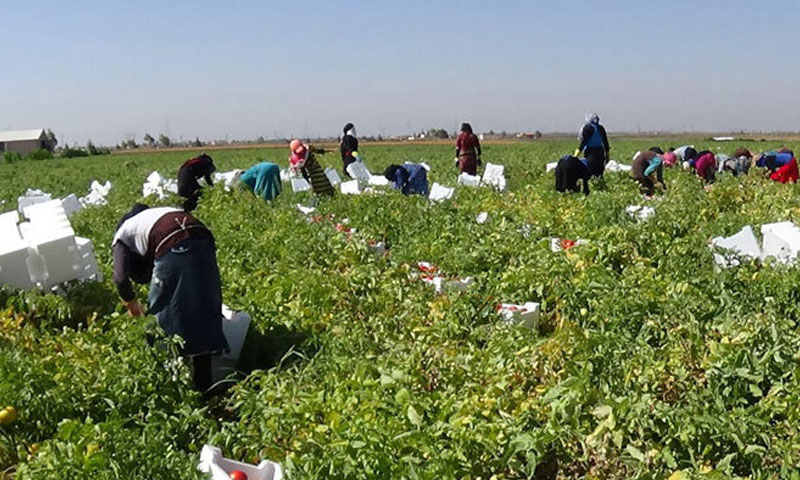The agricultural landscape in Daraa has developed a sense of optimism with the cooperative associations return to action, providing farmers with agricultural supplies, such as fertilizers and phosphate with “convenient” prices compared to those of the black market.
The associations, however, have imposed certain conditions on the farmers in return for providing them with supported fertilizers, including forwarding the names of the farmers wishing to get the fertilizers to the Military Security Branch which conducts a thorough check of their backgrounds before they are handed the substances.
Farmers’ Fertilizers in Safe Hands
According to the security studies which target Daraa’s farmers, they will be either provided with or denied the fertilizers, as farmers, members of the agricultural cooperatives, have stressed to Enab Baladi, in addition to an agricultural engineer, who is a member of an agricultural cooperative in the city of Tafas, southern Daraa.
The engineer, refusing to reveal his name for security considerations, told Enab Baladi that, this undertaking is considered an intervention in the farmers’ affairs on the part of the regime-affiliated military security and an attempt to tighten its security grip at all social levels.
The Military Security has obliged all the agricultural cooperatives to provide it with lists of the names of the farmers wishing to get the fertilizers before the delivery process, as to conduct a security study of these persons and delist those who are not granted a security approval, the engineer added.
The farmers, applying to get the fertilizers, have to present a copy of their identity document and their fingerprint in the place of the name. Then, the copies are to be filed with the list of names and the copies to the Military Security and to the Farmers Union, as explained by the engineer.
He believes that these procedures are a form of pressure on the farmers which might force them to buy fertilizers from the free market, which in turn raises the production costs, especially since the agricultural associations are offering the fertilizers for prices less than those of the market.
It is worth mentioning that the work of the agricultural cooperative associations stopped in the area during the control of the opposition factions which increased the prices of fertilizers and exhausted the agricultural sector. However, these entities resumed action after the Syrian regime took over the area in August 2018, with the return of most of its institutions to work in the governorate.
Difference between Cooperative’s Prices and those of the Market
A bag of nitrogen fertilizer, 50 kg, is sold for about 10 thousand Syrian pounds by the agricultural cooperative associations, while it is sold for 14 thousand Syrian pounds at the black market.
A bag of phosphate fertilizer, however, is sold for about eight thousand Syrian pounds by the agricultural associations, while it is sold for 9500 Syrian pounds on the market, which means an increase of the production costs if farmers decide to resort to the black market, especially since they need massive amounts of fertilizers.
Abu Mahmoud, a former member of a farmers’ association, told Enab Baladi: “Earlier on, the associations played a different role in decreasing the costs of production which farmers had to afford, for they used to provide them with fertilizers, wheat grains, and even fodder for symbolic prices and in massive amounts.”
Abu Mahmoud, a 70 years old man, added that after the regime controlled the area, the associations are back on action, but they could not provide this year’s wheat grains and stipulated that farmers obtain security approval to get the fertilizers, which means the elimination of the farmers disapproved by the security and denying them the privileges offered by the associations.
Abu Omran, a farmer from the al-Yadudah village, southern Daraa, told Enab Baladi that getting fertilizers from the cooperative associations would save him about 80 thousand Syrian pounds per ton of nitrogen fertilizer, and 30 thousand per ton of phosphate fertilizer, which help him decrease the costs of production.
He added that the current security-related undertakings might force him to purchase fertilizers from the black market, which in turn would downsize the annual revenues he gets from cultivating his land.
In Daraa, southern Syria, the agricultural sector is witnessing a weakness in production, especially with the absent support of the farmers’ associations in the past a few years and the soaring prices of fertilizers and organic materials, amides concern that the situation would remain thus after the Syrian regime’s control and the security grip is tightening over the governorate’s vital joints.

